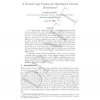Free Online Productivity Tools
i2Speak
i2Symbol
i2OCR
iTex2Img
iWeb2Print
iWeb2Shot
i2Type
iPdf2Split
iPdf2Merge
i2Bopomofo
i2Arabic
i2Style
i2Image
i2PDF
iLatex2Rtf
Sci2ools
135
click to vote
JAPLL
2011
2011
A deontic logic framework allowing for factual detachment
Due to the fact that a large number of our ethical and behavioural norms have a conditional form, it is of great importance that deontic logics give an account of deontic commitments of the form “A commits you to do/bring about B”. It is commonly agreed that monadic approaches are only suboptimal for this task since they have several shortcomings, for instance their falling short of giving a satisfactory account of “Strengthening of the antecedent” or their difficulties in dealing with contrary-to-duty paradoxes. While dyadic logics are more promising in these respects, they have been criticized for not being able to model “detachment” ([8]): A and the commitment under A to do B implies the actual obligation to do B. “We seem to feel that detachment should be possible after all. But we cannot have things both ways, can we? This is the dilemma on commitment and detachment.” ([15], p. 658) In this paper I answer ˚Aqvist’s question with “Yes, we can” by proposing a...
Deontic Logics | Detachment | JAPLL 2011 | Logics |
Related Content
| Added | 14 May 2011 |
| Updated | 14 May 2011 |
| Type | Journal |
| Year | 2011 |
| Where | JAPLL |
| Authors | Christian Straßer |
Comments (0)

